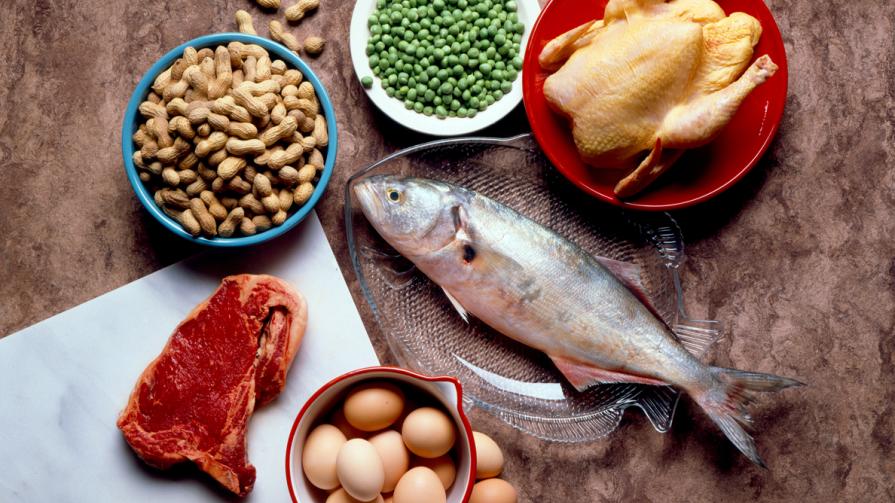13 negative side effects of not getting enough protein

HERE’S THE HARD truth: Most of us don’t get enough protein. Alternatively, some guys think “the more protein, the better,” and over-consume it when they do sit down to eat, chomping down a 30g protein bar and washing it down with a protein shake that’s got upwards of 50g, says Jordan Mazur, M.S., R.D., director of sports nutrition at the University of California, Berkeley.
To put it bluntly: Both are bad.
Everyone has a protein intake ceiling. It varies with your height and weight, but most people can absorb at most 30-42g per meal. Any more, and your body can’t use it to build and repair muscle—so the surplus is stored as fat. “But getting the ‘right’ amount of protein depends on many factors, including your activity levels, age, muscle mass, and current state of health,” Mazur says. “Make sure to consult with a sports registered dietician to find out the right amount for you,” he recommends.
If your diet is low in protein, you might not exhibit any symptoms, and you probably function just fine on a day-to-day basis, Mazur notes. But if you’re under-consuming protein consistently over time, it can result in a range of negative health effects.
Here are the 13 major red flags that you’re not getting enough protein.
1. Weight loss
There are two different kinds of protein deficiency: 1) Kwashiorkor, which occurs when you eat too little protein but enough calories, and 2) Maramus, where your protein and overall calorie consumption are both low. “Ultimately, if you aren’t getting enough protein, that probably means you aren’t eating enough calories, you’re following a bizarre or unhealthy diet, or you have some digestive imbalances,” Mazur says. “If you eat too few calories, your body will use the protein you do eat for energy instead of building muscle,” he adds. Conversely, some people might gain weight, as their bodies respond to a lack of fuel by slowing down their metabolisms.
2. Muscle weakness or muscle wasting
“Middle-aged men may experience sarcopenia, a natural loss of muscle mass due to aging, and they may lose even more muscle if they’re not getting enough protein in their daily diets,” Mazur explains.
3. Swelling
When your body is lacking protein, you can suffer a condition called edema; in short, you balloon in your extremeties because of fluid retention. “Protein plays a part, internally, in keeping fluid from accumulating in tissues, especially in your feet and ankles,” Mazur says.
4. Low blood pressure and low heart rate
When you have a protein deficiency, your body’s blood proteins (thus, your blood’s thickness and stickiness) and blood pressure plummet, per the Mayo Clinic. This then impacts a myriad of other functions in your body since nutrients aren’t getting to vital tissues. If your body fat percentage is too low or you’re not getting enough protein, you can suffer something called bradycardia, or slow heart rate. If you wear a tracker and notice your heart rate’s dropped anywhere below the normal 60 to 100 beats per minute, make an appointment to see your doctor. You could feel short of breath, light-headed, and possible even faint as a result; and, as you can imagine, these are all terrible side effects if you’re an avid gym goer.
5. Nutrient malabsorption
If you’re not eating enough protein sources, like red meat, your body can have a hard time getting and absorbing nutrients such as niacin, iron, zinc, and calcium Mazur says.
6. Liver problems
Protein deficiency and liver disease are often lumped together, according to research from the Annual Review of Nutrition. Without protein, your liver struggles to remove lipids and detox.
7. Anemia
If your body isn’t properly nourished by protein, you’re prone to lack vitamin B-12 and folate, which can spur anemia—a condition where your body doesn’t produce enough red blood cells. This can also cause low blood pressure and fatigue.
8. Immunity
“Your overall immunity may suffer, which could take the form of getting sick regularly or taking longer to recover,” Mazur says. Your immune cells are made from proteins, so you’re going to suffer a domino effect if your diet isn’t balanced.
9. Food cravings
Oddly enough, constant food cravings and increased hunger can point to a deficiency. “Needing snacks between meals may be the consequence of a diet high in carbs and sugar and low in protein. “Protein evens out blood sugar highs and lows,” Mazur explains, so it can regulate your hunger.
10. Muscle and joint pain
“Muscle weakness, pain, or being flabby where you used to be muscular may be a sign your muscles or joint fluid is breaking down to supplement calories instead of using the protein you eat to build muscles, tissues, and cells,” Mazur says.
11. Slow recovery from injuries
Just as your immunity takes a hit, your body’s ability to heal and rebuild new cells, tissue, and skin can be impeded by a lack of protein, Mazur says.
12. Hair, skin, and nail troubles
“Thinning hair, peeling skin, and ridges in your nails are some of the first signs your body may not have enough protein,” Mazur says.
13. Brain fog
Short bursts of mental energy, followed by a looming fog may be related to fluctuating blood sugar and lack of protein, Mazur offers. Pay attention to your body and any small or large changes.
4 things you can you do if you think you’re lacking in protein
- Cut back on processed foods. If you’re eating lots of carbs and sugars throughout the day, replace ’em with whole foods like fresh meat, hard boiled eggs, Greek yogurt, and whole grains, fruits, and vegetables.
- Eat alternative protein sources. If you’re vegan or vegetarian—or not—try plant-based protein sources like whole grains, lentils, soy, beans, nuts, seeds, and vegetables.
- Consider a protein powder supplement. If you need help getting more protein into your diet, try supps made from soy, egg, rice, peas, or whey.
- Check with your physician or dietitian. If you’re eating plenty of protein, but suffer the above side effects, you may have low stomach acid, which means your body isn’t absorbing the nutrients. Certain supplements (like digestive enzymes and Manuka honey) can help.
[“source-ndtv”]




